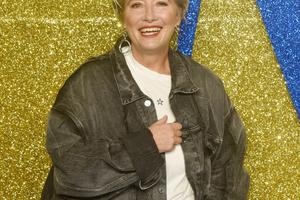Entertainment
/ArcaMax

Dame Emma Thompson turned down date with Donald Trump
Dame Emma Thompson turned down a date with US President Donald Trump.
The 66-year-old actress has revealed she was on the set of her movie Primary Colors back in 1995 when she received a phone call from the businessman asking her whether she would like to go out for dinner and stay at one of his hotels - and she initially thought it was a joke....Read more

Kathy Griffin undergoes third facelift
Kathy Griffin is recovering after undergoing her third facelift.
The 64-year-old comedian admitted the decision to go under the knife again was "vain" but insisted she just wants to look her best because she's photographed so often when she's not wearing make-up.
During an appearance on the Talk Your Head Off podcast, Kathy explained: "This is...Read more

Sharon Stone kept mom's death secret so she could process her feelings
Sharon Stone kept her mother's death secret for months because she wanted to be able to process her feelings in private.
The Basic Instinct star went public with the sad news in July - four months after Dorothy passed away in March at the age of 91 - and Sharon has now revealed she wanted time to grieve before she told the world about the ...Read more

Jackie Chan fears he'll die on set
Jackie Chan is "scared" of stunts and fears he will die on set.
The 71-year-old movie star - who started his career as a stuntman before turning to acting - has admitted he always gets nervous before filming a big scene and regularly worries that he will meet a nasty end if an ambitious action sequence goes wrong.
During an appearance at the ...Read more

Jurnee Smollett hails 'lovely' co-star Taron Egerton
Taron Egerton is a "lovely human being", according to Jurnee Smollett.
The 38-year-old actress stars alongside Taron, 35, in Smoke, the new Apple TV series, and Jurnee has revealed that she loved the experience of working with him on the show.
The actress - who has Hunter, eight, with Josiah Bell, her ex-husband - told People: "Taron couldn't ...Read more

Record labels became hesitant after I turned 30, says Nicole Scherzinger
Nicole Scherzinger thinks record labels became hesitant to support her music after she turned 30.
The 47-year-old singer enjoyed huge success as part of the Pussycat Dolls between 2003 and 2010, but Nicole claims that attitudes towards her changed after she turned 30.
During an appearance on CBS Sunday Morning, Nicole explained: "I'll never ...Read more

Jamie Lee Curtis hails Freakier Friday co-star Lindsay Lohan
Jamie Lee Curtis learned "perseverance" from Lindsay Lohan.
The 66-year-old actress has reunited with Lindsay for Freakier Friday, the sequel to their 2003 comedy movie Freaky Friday, and Jamie has taken to social media to heap praise on her co-star.
Jamie's Instagram post featured a quote from Lindsay in which she praises her co-star. The ...Read more

Tim Burton 'knew' Jenna Ortega was perfect for Wednesday
Tim Burton "knew right away" that Jenna Ortega was the perfect candidate to play Wednesday Addams.
The 22-year-old actress plays the titular character in Wednesday, the hit Netflix series, and Tim never had any doubts that she would succeed in the role.
Tim, 66 - who directs and executive produces the series - told The Independent: "You can't ...Read more

Josh Duhamel embraces 'the simple things in life'
Josh Duhamel quit life in Los Angeles because he wanted to "get back to the basics".
The 52-year-old actor decided to leave the brights of Los Angeles behind and move to Minnesota, where he's embraced a totally different lifestyle.
Speaking to People, Josh explained: "I make movies and TV shows, and I love it, I truly do love it, but I had ...Read more

Elizabeth Weber: I never thought of Billy Joel as a homewrecker
Elizabeth Weber "never thought of Billy Joel as a homewrecker".
The 76-year-old music star was married to Elizabeth between 1973 and 1982, but she's denied that Billy was responsible for the end of her first marriage to singer Jon Small.
Elizabeth explained to Us Weekly: "I never thought of Bill as the homewrecker."
She added: "The home was ...Read more

Linda Hamilton sees herself as an 'introvert'
Linda Hamilton feels "really uncomfortable" with praise.
The 68-year-old actress stars alongside the likes of Max Martini, Brianna Hildebrand, LaMonica Garrett, and Michael Irby in Osiris, the new sci-fi action film, and Linda has confessed to feeling uncomfortable with the praise she's received in recent times.
The actress - who previously ...Read more

Pete Davidson reveals how Eddie Murphy inspired him
Eddie Murphy inspired Pete Davidson to reduce his social circle.
The 31-year-old actor stars alongside Eddie, 64, in The Pickup, their new comedy movie, and Pete has now confessed to being inspired by his co-star.
Speaking to People, Pete joked: "I've been guilty of having 700 friends in the green room. People I just met or are just in the ...Read more

Bella Thorne recalls being 'obsessed' with Lil Wayne
Bella Thorne was "obsessed" with Lil Wayne during her school years.
The 27-year-old actress fell in love with hip-hop music while she was starring in Shake It Up, the Disney sitcom that also featured Zendaya, and Bella even wrote a school essay about her admiration for Lil Wayne.
Asked to recall the first single she ever downloaded, Bella told...Read more

Chris Hemsworth's diagnosis changed his outlook
Chris Hemsworth's perspective on life changed when he learned he had a greater chance of developing Alzheimer's disease.
The 41-year-old actor previously learned that he is, biologically, eight to ten times more likely than other people to develop Alzheimer's, as he carries two copies of the APOE4 gene, and Chris admits that the revelation has ...Read more

Kelly Clarkson and Brandon Blackstock 'changed their perspectives'
Kelly Clarkson and Brandon Blackstock "changed their perspectives" amid his cancer battle.
The talent manager died on Thursday (08.07.25), aged 48, after battling cancer for more than three years, but a source has now claimed that the former couple changed their perspective following their bitter divorce.
The insider told Us Weekly: "Co-...Read more

Brooklyn and Nicola Peltz-Beckham's 'beautiful' vow renewal
Brooklyn Peltz-Beckham would renew his wedding vows with wife Nicola "every single day" if he could.
The couple married in April 2022 after three years of dating and, earlier this month, they reaffirmed their commitment to one another in a "beautiful" ceremony.
Brooklyn, 26, told PEOPLE: "It was beautiful. We just wanted a really beautiful ...Read more

Perrie Edwards' six-figure beauty deal
Perrie Edwards has signed a six-figure beauty deal with L'Oreal.
The 32-year-old singer is set to be the new face of skincare brand CeraVe, after being signed up by parent company L'Oreal on a $400,000 deal.
A source told The Sun's Biz on Sunday: "Perrie wants to show that taking care of your skin can be affordable and people don't need to ...Read more

Selena Gomez's one rule for touring again
Selena Gomez would only tour again if she can perform Who Says.
The 33-year-old actress and musician revealed the special connection she has with the song, which was the lead single from When the Sun Goes Down, the final album from Selena Gomez the Scene.
She told the Therapuss podcast: "It's the most powerful moment when I get to perform it...Read more

Bob Dylan back in the studio
Bob Dylan is back in the studio.
The 84-year-old musician - who is currently performing on Willie Nelson's Outlaw Music Festival Tour - recently spent two days at White Lake Studios in Albany, New York, with "members of his band".
A press release quoted David Bourgeois, the studio's CEO, saying: "We want every artist and guest to feel relaxed ...Read more

Andrew Lloyd Webber wants Nicole Scherzinger for Sunset Boulevard movie
Andrew Lloyd Webber wants Nicole Scherzinger to star in a movie adaptation of Sunset Boulevard.
Nicole, 47, recently ended her run as Norma Desmond in the much-hyped revival of Lloyd Webber's classic musical on Broadway and the pair are hoping to team up again to bring the project to the big screen.
A source told The Mirror: "Andrew wants to ...Read more
Inside Entertainment News
Popular Stories
- Kelly Clarkson 'putting her children first as she grieves over death of ex-husband Brandon Blackstock'
- Jamie Lee Curtis hails Freakier Friday co-star Lindsay Lohan
- Bob Dylan back in the studio
- Brooklyn and Nicola Peltz-Beckham's 'beautiful' vow renewal
- Chris Hemsworth's diagnosis changed his outlook











